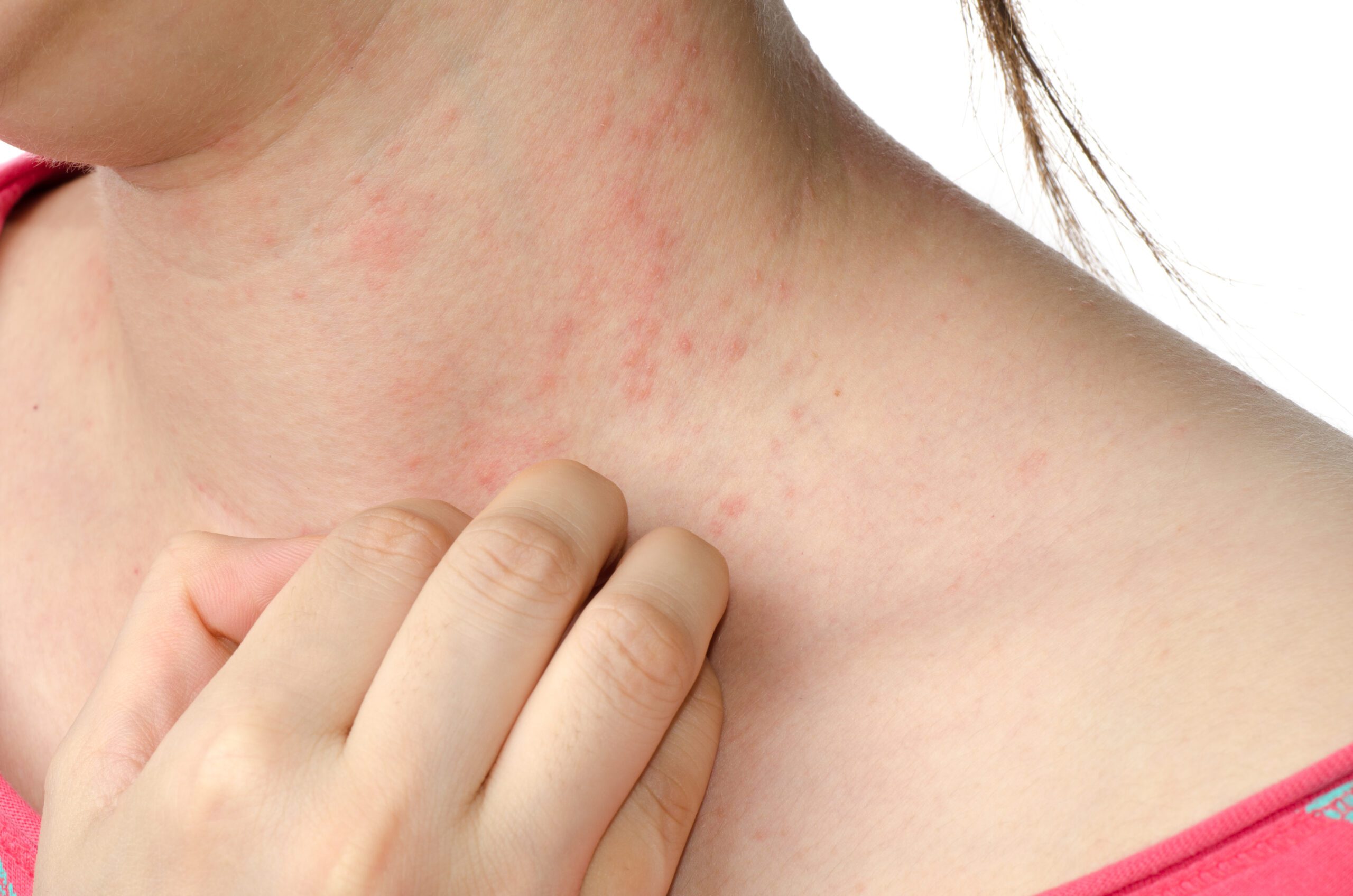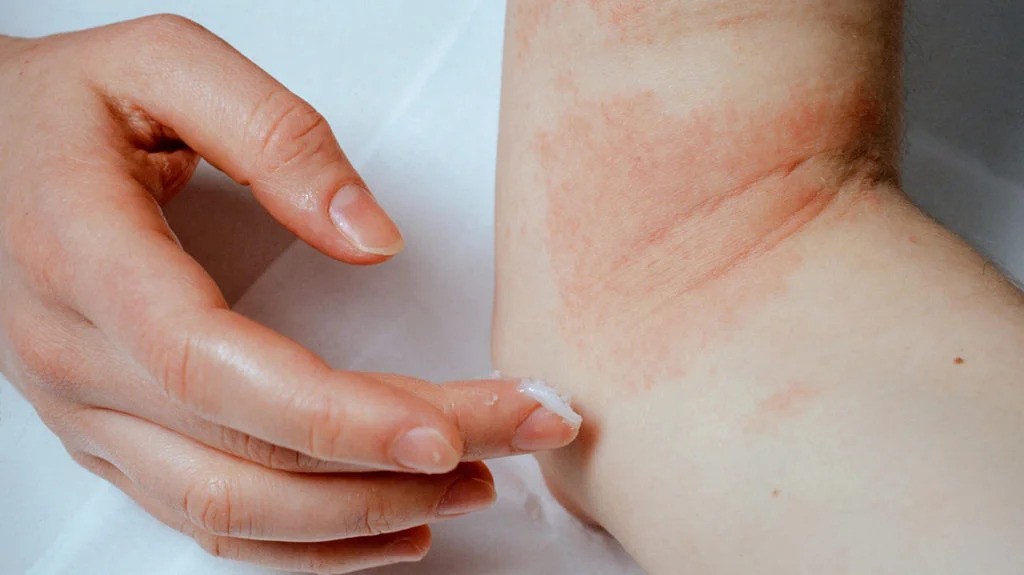Eczema Flare-Up Triggers Unveiled - Identifying Common Factors
Millions of people worldwide suffer with eczema, a chronic skin disorder marked by inflammation, itching, and redness. We will dissect the complex network of eczema flare-up triggers, illuminating the typical elements that aggravate symptoms.
Author:Daniel JamesReviewer:Karan EmeryFeb 27, 20241K Shares75.5K Views

Millions of people worldwide suffer from eczema, a chronic skin disorder marked by inflammation, itching, and redness. Even though the precise origin of eczema is still unknown, knowing what triggers it is essential to treating it well.
Flare-ups of eczema can be brought on by a number of things, from internal physiological changes to external environmental influences. We will dissect the complex network of eczema flare-up triggers, illuminating the typical elements that aggravate symptoms.
Allergens
Allergens, which include mold, dust mites, pollen, and pet dander, can cause immune system reactions that cause skin inflammation and irritation, and are a major cause of eczema flare-ups. It's important to recognize these allergens and limit contact with them because exposure to them can worsen eczema symptoms in affected persons.
Eczema symptoms can be effectively managed by implementing strategies including using bedding that is resistant to allergens, cleaning indoor places often to minimize the buildup of dust and mold, and avoiding exposure to outdoor allergens during peak seasons. Comprehensive eczema therapy also includes working with an allergist to identify certain allergens through testing and creating a customized allergen avoidance strategy.
Irritants
A wide variety of compounds are classified as irritants because they can aggravate skin irritation, increase inflammation, and cause itching and inflammation in eczema patients. Harsh soaps, detergents, perfumes, and skincare products with alcohol or other irritants are common sources of irritation. The skin's ability to function as a barrier may be weakened by exposure to these substances, which might enhance sensitivity and make flare-ups more likely.
The risk of an exacerbation of eczema can be reduced by using mild, fragrance-free products, avoiding extended exposure to water and harsh chemicals, and using protective gloves while handling irritants. To properly treat their illness and preserve the health of their skin, people with eczema must be diligent in recognizing and avoiding irritants.
Stress
Stress can weaken the immune system and aggravate skin inflammation, which is why it is a major factor in the onset of eczema flare-ups. It is commonly known that eczema and stress are related, with many people reporting worsening itching, redness, and pain during stressful times.
Stress-reduction methods including yoga, deep breathing exercises, mindfulness, and regular exercise can help lower stress levels and lessen the symptoms of eczema. Stress management and eczema control can also be enhanced by putting self-care first, keeping a healthy work-life balance, and asking friends, family, or mental health specialists for support.
Temperature Changes
Eczema flare-ups can be significantly triggered by temperature fluctuations, with symptoms being exacerbated by both extreme cold and heat. While extreme heat can increase perspiration and create itching, cold weather can result in dry, irritated skin. The risk of flare-ups can be reduced by shielding the skin from temperature extremes by wearing clothing appropriate for the season, using moisturizers to stay hydrated, and avoiding prolonged exposure to hot or cold surroundings.
Furthermore, controlling indoor temperatures and preserving skin comfort can be achieved by utilizing air conditioners in hot areas and humidifiers in dry ones. Keeping an eye out for temperature fluctuations and protecting the skin can be very helpful in controlling eczema and averting flare-ups.
Sweating
Sweating is a typical cause of eczema flare-ups, especially in those who are predisposed to the condition since it irritates the skin and makes itching and inflammation worse. Sweat that gets pressed up on the skin might irritate and pain the area even more. Wearing loose-fitting, breathable clothing, taking a shower or gently cleansing the skin after sweating, and avoiding activities that encourage excessive sweating are some ways to reduce the negative effects of perspiration on eczema.
Keeping the area dry and lowering the chance of flare-ups can be achieved by applying absorbent powders or antiperspirants to skin folds that are prone to perspiration. People can efficiently control their sweat and maintain the health of their skin when they manage their eczema symptoms.
Food Triggers
Food triggers play a major role in eczema flare-ups because, in susceptible individuals, several foods can worsen inflammation and skin irritation. Dairy products, eggs, almonds, soy, and gluten are common food triggers; however, individual responses may differ. One useful tool for identifying personal causes for eczema symptoms is a food diary, which tracks how different foods affect symptoms.
Once trigger foods have been identified, restricting or eliminating their consumption can help control eczema and lessen the severity and frequency of flare-ups. Seeking advice from a trained dietitian or healthcare expert can offer additional direction on recognizing and handling food triggers for eczema.
Microbial Infections
Microbial infections, such as those caused by bacteria, viruses, or fungi, can cause inflammation and skin irritation, which can greatly worsen the symptoms of eczema. People who have eczema are more prone to infections because their skin barrier is damaged.
Particularly prevalent bacterial infections, including those caused by Staphylococcus aureus, can result in leaking sores and heightened irritation. Fungal infections, like ringworm, can create red, scaly areas on the skin, while viral infections, like herpes simplex virus (HSV), can cause excruciating blisters.
It is crucial to treat microbial infections as soon as possible with the right drugs, such as antibiotics, antivirals, or antifungals, to stop the inflammation from getting worse and to stop the symptoms of eczema from getting worse. Practicing excellent hygiene can help stop the spread of infections and lower the likelihood of flare-ups in eczema sufferers. Examples of these practices include washing your hands frequently and not sharing personal objects.
Hormonal Changes
For many people, hormonal changes brought on by menstruation, puberty, or pregnancy can significantly affect eczema symptoms. Hormone fluctuations can affect the immune system and the function of the skin barrier, increasing inflammation and making a person more prone to flare-ups. Eczema symptoms frequently develop in women during specific hormonal periods, such as premenstrual or pregnancy.
Reducing eczema flare-ups and controlling hormone levels can be achieved by controlling hormonal changes under a doctor's supervision, for example with hormone therapy or contraceptive choices. Effective management of eczema symptoms can also be achieved by implementing stress-reduction tactics during periods of hormonal swings and by following a regular skincare regimen.
Eczema Flare-up Triggers - FAQ
What Is Causing My Eczema Flare Up?
Environmental allergens, such as: cigarette smoke, cockroaches, dust mites, pet dander, pollen, insect bites, bee stings; allergic reactions to these triggers come in many forms. Climate factors, including: the change in season, extreme heat, extreme cold, dry weather or humid weather.
What Is The 3 Minute Rule For Eczema?
The most effective way to lock in moisture is to apply to damp skin, which is usually within 3 minutes of stepping out the bath or shower. Allowing your skin to dry out completely before applying moisturiser gives the moisture in your skin time to evaporate.
What Is The Fastest Way To Heal Eczema?
Corticosteroid creams, solutions, gels, foams, and ointments. These treatments, made with hydrocortisone steroids, can quickly relieve itching and reduce inflammation. They come in different strengths, from mild over-the-counter (OTC) treatments to stronger prescription medicines.
Final Words
In order to properly manage this chronic skin conditions, it is important to understand and identify eczema flare-up triggers. By empowering people to take proactive steps with their skincare treatments, lifestyle decisions, and environmental exposures, this understanding eventually improves quality of life and helps control eczema more effectively. People can overcome the difficulties of eczema with confidence and achieve long-term skin health and comfort by maintaining vigilantly and using a customized approach to trigger management.

Daniel James
Author
Daniel James is a distinguished gerontologist, author, and professional coach known for his expertise in health and aging.
With degrees from Georgia Tech and UCLA, including a diploma in gerontology from the University of Boston, Daniel brings over 15 years of experience to his work.
His credentials also include a Professional Coaching Certification, enhancing his credibility in personal development and well-being.
In his free time, Daniel is an avid runner and tennis player, passionate about fitness, wellness, and staying active.
His commitment to improving lives through health education and coaching reflects his passion and dedication in both professional and personal endeavors.

Karan Emery
Reviewer
Karan Emery, an accomplished researcher and leader in health sciences, biotechnology, and pharmaceuticals, brings over two decades of experience to the table. Holding a Ph.D. in Pharmaceutical Sciences from Stanford University, Karan's credentials underscore her authority in the field.
With a track record of groundbreaking research and numerous peer-reviewed publications in prestigious journals, Karan's expertise is widely recognized in the scientific community.
Her writing style is characterized by its clarity and meticulous attention to detail, making complex scientific concepts accessible to a broad audience. Apart from her professional endeavors, Karan enjoys cooking, learning about different cultures and languages, watching documentaries, and visiting historical landmarks.
Committed to advancing knowledge and improving health outcomes, Karan Emery continues to make significant contributions to the fields of health, biotechnology, and pharmaceuticals.
Latest Articles
Popular Articles
